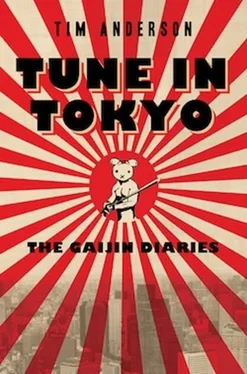I looked at my viola, listlessly leaning against its case in my bedroom, aching to be touched, caressed, and gripped forcefully yet lovingly by expert hands. I hadn’t picked it up in many months, and the last time I had, I’d gotten the distinct impression that the viola was trying to tell me it would really rather I put it down and find a nice young five-year-old music student to sell it to.
“You really need to get the hell out of this house,” my boyfriend Jimmy would tell me as I sucked in my twentieth bong hit of the day and exhaled a plume of smoke out of every orifice in my head. “You’re languishing .”
Now, I take notice when Jimmy uses words with more than two syllables (he generally doesn’t care to take the time), and he got me thinking. Maybe he was right: I wasn’t just bored, or directionless, or lazy, or confused, or stoned, or scared, or paranoid, or worried about being brutally murdered on the street tomorrow without having accomplished anything in my life. I was languishing , like Miss Havisham in Great Expectations or Rosanna Arquette in Desperately Seeking Susan . (Who will be my Madonna?) When was the last time I’d actively engaged with the world, followed a confused path of my own making, did something remarkable, maybe threatened to stir up some trouble?
Well, let’s see. There was that time about a year ago when, in search of a fourth job, I’d visited the temp agency and gotten the highest score they’d seen in months-months!-on the typing test. (I’m a really good typist.) Also, that time last week that I’d woken up, gotten high, and watched a Today Show interview with Ann Coulter, marveled aloud at how much her neck looks like the shaft of an erect penis, and then shouted at that squawking blonde dick-head until Jimmy set a plate of cinnamon buns down in front of me to shut me up. But surely there was more to life than that.
Then it came to me: the last time I’d felt totally wide awake and alive was the last time I lived outside the country. After graduating from college, I’d jetted off to London, a city I’d fallen in love with a few years before during a year abroad in Manchester. I’d stayed as long as I was legally able (Americans are only allowed six-month worker visas for the good of the country), living it up in Jack the Ripper’s old neighborhood. When I was kicked out by the Home Office, I’d gone home, gotten one job, then another, and then another, and five years later I was neck-deep in the rut from which I was now desperately in need of extrication.
Jimmy was right: I needed to get out of the house, this much was clear. Wake myself up, splash my ashen, sallow face with some cold water, and force myself to at least meet the world halfway. This time, though, I wanted to go where I’d truly be appreciated. Not that England hated me, but it goes without saying that the English have a love-hate relationship with Americans. To your typical Briton, Americans are loud, hardly ever dressed properly, remain largely oblivious to most events that occur beyond our own borders, and, most importantly, have completely bastardized the English language and simultaneously, through the cultural imperialism of movies and television shows, made “American” the most widely spoken and recognized strain of English in the world. Plus, we use the word “quaint” to describe any house built before 1970. Me, I was ready to go where my status as a U.S. passport holder and card-carrying “American English” speaker was an asset rather than a liability (a list of countries that was shrinking by the second). Besides, I was craving positive vibes, and British people always sound pissed off about something.
Then one day at Berlitz, Hiro, one of my students who loves bluegrass music and playing the banjo, made a suggestion that had been staring me in the face for months: “You should come in Japan!”
And I thought, “You know, I really should.” It’s on the other side of the world, for one. Also, I wouldn’t be able to understand anything anyone said: another plus. Best of all, they don’t totally hate Americans there yet, do they?
Here was a race of people who not too long ago had been our enemy, yet now, in the popular American imagination, they seemed to love us-drinking our sodas, watching our movies, building their own copycat of Walt Disney World, sending their children to bed with Snoopy and Woodstock. Who were these people? What were their dreams, hopes, and fears? How the hell did they remember each other’s names? Most importantly, what would they think of me?
Japan was much more provocative than, say, Finland or New Guinea. Whenever Westerners speak of Japan and the Japanese, it seems every statement they make-whether it’s about their movies, television shows, rock bands, customs, pornography, or fondness for cutting their abdomens-includes the words crazy and some variation on fucking .
“I saw this crazy fucking Japanese movie about a homicidal videotape this weekend,” for example. Or maybe, “I got this crazy fucking Japanese digital camera,” or “Jesus Christ, that bukkake live-stream site is fucking stupid crazy.” I wanted to go behind all these knee-jerk statements and witness the mania myself.
Yes, I would go to Japan and do something insane of my own: I would play my viola on top of Tokyo Tower, write and perform my own haiku on early-morning rush-hour trains, find an unorthodox use for chopsticks, realize my dream of playing keyboards in an all-Japanese New Wave rock band. I would get out there, stomp the pavement, and leave my mark. (Would it be a bloodstain? Time would tell.)
I decided on Tokyo, throbbing heart of the nation, with its sci-fi architecture, kaleidoscopic electric lights, kimono-clad Betties talking on illuminated cell phones, spacepods, decent public transportation, and local celebrities like Yu-Gi-Oh, Mothra, and, yes, Hello Kitty.
Tokyo is a giant city of 5.3 bazillion people. Though it was largely decimated by American bombers during World War II, it has risen from the ashes and now boasts the highest number of giant television screens per square mile of any city in the world. The seat of the world’s second-largest economy, this gigantic humongous gargantuan extra-stupendously titanic megalopolis stands bravely in the face of typhoons, earth tremors, and Tom Cruise press junkets. And let’s not forget the constant barrage of giant lizards, arachnids, and flying insects that habitually wreak havoc on the public transportation system and, even worse, never ever take their shoes off when they enter a room, even when they’re asked nicely.
As a young boy, whenever I’d catch an episode of that old documentary series on the Tokyo Godzilla attacks, I was always struck by the thought that I could fit in there among those howling masses. After all, I’m really good at running away from things screaming, crawling into inaccessible areas, and using passersby as human shields.
And so now, almost a full-grown man, I would finally go there. The future was neon, and I’d bring my light switch.
Surely a utopian futuristic urban monstrosity awaited me: a place where people didn’t walk down the street but stood reading inscrutable newspapers on moving sidewalks. Where they talked to their friends on small, portable video screens. Where they didn’t sit in traffic, they simply levitated above the masses of pedestrians and bicyclists and blasted off in their CZX Toyota hovercrafts. A place where huge bronze statues of the Buddha sat happily alongside giant Day-Glo plastic Pokémon figurines.
And me, I would find my place there. I would walk the acid-rain-soaked streets by night clad in a beige trench coat, a cigarette dangling from my pouty lips, a hardened, city-delirious look on my face. I would order steamy ramen from a sidewalk noodle bar using the Tokyo slang so pervasive in whatever part of the city I was haunting that night. The neon would reflect off my sleek black sunglasses. I would begin reading up and down and right to left.
Читать дальше












